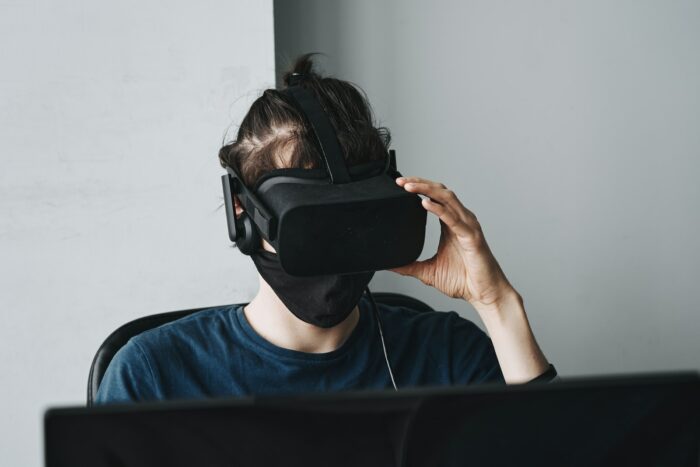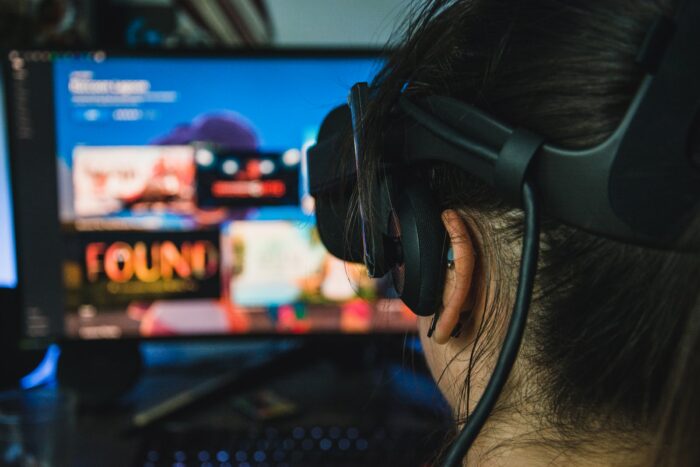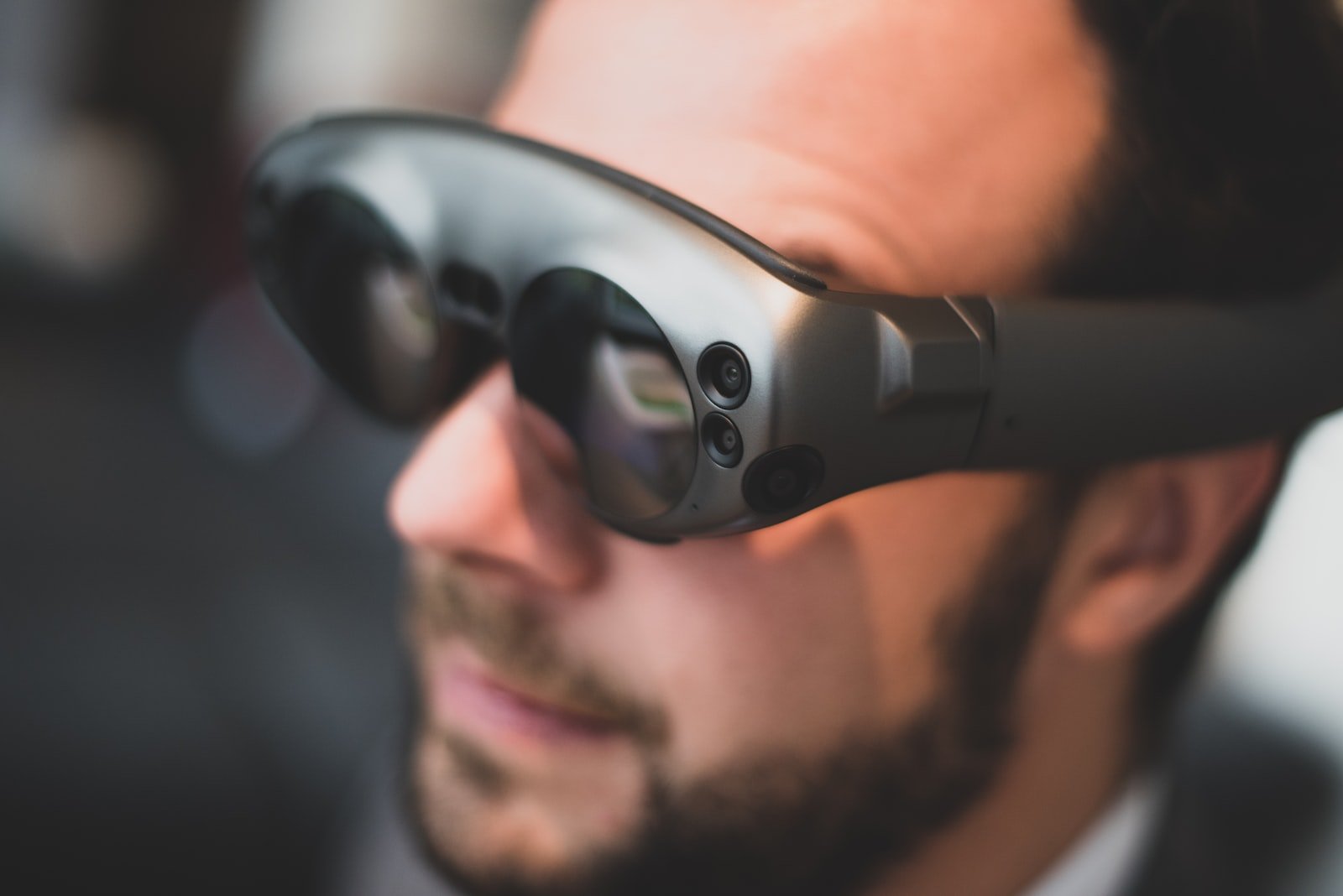With all the recent hype around the Metaverse, numerous tech companies are working on developing headsets and other hardware. Metaverse headsets allow users to immerse themselves completely into virtual worlds such as Decentraland, Horizon Worlds, and the Sandbox.
This article aims to provide a complete overview of the different types of Metaverse headsets, their features, and more. So, without any delay, let’s dive into it.
Introduction to Metaverse Headsets
Referred to as “the future of social media,” the Metaverse is set to revolutionize how we interact online. Metaverse headsets significantly transform digital experiences because they allow users to step into an immersive 3D virtual world.

Users utilize avatars to move around and interact in the virtual realm, and Metaverse headset controllers help them control their movements. Metaverse headsets have improved immensely over the years, with companies such as Meta, Microsoft, and Lenovo working relentlessly on creating affordable immersive headsets packed with exciting features such as 3D sounds, 1080p vision, wireless connectivity, hand tracking, and much more.
If you are interested in learning more about metaverse devices that can be used with headsets, check out our article: Top 8 Metaverse Devices | Must-Have Equipment for the Metaverse
Features of Metaverse Headsets
Metaverse headsets offer an excellent resolution; for example, the HP Reverb 2 offers a 2160×2160 per-eye resolution. This helps make the entire virtual experience seem much more real with 3D objects and avatars in the digital realm. The headsets also utilize various sensors such as accelerometers, gyroscopes, magnetometers, and much more.
A wider field of view and improved ergonomics are also included in most modern-day headsets. These headsets also include a display with built-in vision corrections, variable focus, eye tracking for all, and distortion correction. The headsets also have a high dynamic range (HDR), visual realism, and facial reconstruction that users can benefit from.

How to Use Metaverse Headsets
Depending on the type of console you’re using to access the Metaverse and the kind of headset you need to connect and pair your headset to your console. For example, if your headset is wireless, you can connect it via Bluetooth, or you would have to connect it via a wired connection if your headset is not wireless.
Here are some of the steps you need to go through to begin using your headset:
- First, download a Metaverse application (such as Horizon Worlds) on your console and install it.
- Then turn on your Metaverse headset and go to settings and insert your pairing code.
- You may have to log into your Metaverse account.
- After that, open the application on your console and go to the menu.
- Create your avatar and click submit
- Enter Metaverse and enjoy the immersive experience. You can utilize the controllers to move around and the trigger buttons to interact with items.
What Are the Best Metaverse Headsets in 2024?
Many brands are working on developing Metaverse VR headset technology. You can buy multiple varieties of Metaverse VR headsets available in the market and wear them to get the full Metaverse experience. We’ve outlined some of the best Metaverse VR headsets for 2024 below:
1. Project Cambria
Previously known as Oculus Quest Pro, this headset was released in October 2022. This advanced Oculus Metaverse headset is renowned for its incredibly realistic color pass-through and facial recognition. In addition, the headset’s ability to be used for both AR and VR applications is a huge benefit. However, it is essential to note that due to its high price point, i.e., $1500, this is an enterprise-level headset and is not for the average consumer.
2. MetaQuest 2
The MetaQuest 2 is a much more affordable headset as compared to the Quest Pro. The headset is priced at $399, comes with hand tracking, offers 128 GB of storage, and is compatible with PC. The benefits of Metaverse Oculus include wireless functionality, excellent touch controllers, comfortable headset design, and dual-purpose use as a PC VR headset. The drawback is that logging in requires a Facebook account.
3. Lenovo Think Reality A3
These smart glasses are less bulky than traditional headsets and are preferred by office professionals. These Metaverse VR glasses provide access to personalized personal workplaces through a virtual display at home. It connects to Windows laptops, which is advantageous, and users can even add their prescription lenses to these for eyesight correction. In addition, the lens can be easily swapped out if multiple individuals use the glasses, allowing them to be customized according to the user’s needs. The drawback is that it demands a PC with powerful processing to function efficiently. These glasses are available for $1499 and can be purchased directly from the site.
4. HP Reverb G2
The HP Reverb G2 is widely known for its incredible image resolution. One of the best Metaverse headset’s keys benefits is its excellent high-resolution display (2,160×2,160 pixels per eye), crisp audio, and comfortable shape. Unfortunately, the headset requires wired connectivity, and many users have sometimes experienced issues with the controllers. However, its pros definitely outweigh the cons, and it is priced at $499.
5. HoloLens 2
The HoloLens is one of the most expensive options on the market. It offers access to “Mixed Reality,” where 3D virtual objects are superimposed onto real-life surroundings. The HoloLens2 primarily targets industrial solutions, with Kawasaki and Heinz being the first to test the headset. The reviews are phenomenal, and despite its exorbitant price of $3500, the headset has been very successful. It is being used in many industries to improve efficiency, resolve real-time issues, and for training purposes.
6. Sony PlayStation VR
Priced at $299, the Sony PSVR has been primarily designed for gaming purposes. It offers an impressive 1920x1080p resolution and powerful 3D audio. In addition, the headset provides access to a wide variety of VR games, even though many users were initially unhappy with the controllers. Sony then released the Dual Sense Edge controllers in August 2022, and the reviews have been excellent.
7. Valve Index
The comfortability of this Metaverse VR headgear, which provides a glove-like structure to handle, makes it one of the best and most popular options. The “knuckle” controls, which are very sensitive for five fingers, are the primary components of this headset. This headset has the benefit of ergonomic controls, a premium headset, and compatibility with Vive hardware. However, the cost, setup, and tethering cable requirements of this headgear are drawbacks. Compared to other options, many consider these controllers expensive. They are priced at $999 and can be purchased directly from Steam.
What Are the Most Popular Applications of Metaverse Headsets?
As we come closer to an era of borderless connectivity, Metaverse headsets are being utilized for various purposes in our daily lives. Here are a few of the most popular applications of Metaverse headsets that you can find in your everyday life:
VR Headsets for Gaming
The VR metaverse gaming industry is projected to be worth $2.4 billion by 2024. The production of incredible VR games has sparked massive VR adoption worldwide. VR headsets have revolutionized the gaming industry as players can now step into the games from a first-person perspective and view their surroundings with a 360-degree field of view.
Since the 1990s, 3-dimensional worlds have been produced via video games. As a result, more lifelike 3-dimensional models and engaging effects have been introduced every year, which complement VR headgear nearly flawlessly.
Read Also: 22 Best Multiplayer VR Games in 2023 [Gamer’s Review]
There are several exciting VR games, such as Beat Saber, Half-Life: Alyx, Resident Evil 7, and much more, for users to choose from. In addition, more intense full-body controls made possible by VR completely immerse the players in the experience.

Metaverse Headsets in Music
Almost all facets of the music business are altering due to VR. VR allows people to produce, enjoy, and perform music in various ways. In addition, numerous specialized applications that employ VR to assist students in learning, honing, and perfecting their musical talent are currently available. Teach-Um, for instance, allows you to learn how to play the piano or the drums through a VR headset.
However, not everyone is using virtual reality (VR) headsets to learn how to make music. One of the rapidly growing phenomena in this new virtual world is online VR performances and concerts. Most metaverses have established in-game economies, so people can purchase tickets to see virtual concerts from the comfort of their own homes.
Several well-known artists, like Ariana Grande, Justin Bieber, and Twenty-One Pilots, have played to ever-increasing audiences of admirers in the Metaverse. In addition, elements of the business that consumers take for granted are being reimagined by virtual reality. For instance, music videos are perceived as being passive. However, metaverse headsets enable you to enter music videos and actively participate in the entire experience.
Metaverse Headsets in Manufacturing
Current research on the general perception of VR in the industrial sector has been seen. Furthermore, most manufacturers think VR and AR will be essential in increasing efficiency and resolving key supply chain issues.
Take the example of a specialist who is far away from a damaged manufacturing element. He might be able to work with the injured section by putting himself in his coworkers’ shoes using VR goggles. As though he were physically present, he could provide instruction and support remotely. Even the engineering industry benefits from this opportunity for collaboration. Together, design engineers may create virtual prototypes without concern for expenses.
VR headsets allow individuals in the manufacturing business to train for risky scenarios while staying safe, much as it does in sports and medicine. Virtual reality (VR) can replicate any potentially dangerous event to prepare users for practical mitigation measures.
Metaverse Headsets in Tourism
Many individuals have the desire to explore the globe and all of its attractions. However, time, money, and safety are always issues, which is disappointing. Consider being able to go anywhere in the world, anywhere, immediately, simply by putting on a headset.
Consider visiting the tallest structure in the world as an example. The Burj Khalifa dominates the surroundings and provides a fantastic view. Apart from experiencing the view in VR, you may virtually parachute leap from the peak of the Burj Khalifa in the Mission 828 VR experience.
COVID helped many industries look into alternate solutions to generate revenue. For example, in response to the outbreak, the Faroe Islands tourist authority developed a digital tour of the region. As a result, people may traverse the world securely from their houses using virtual reality, which is expanding exponentially.
Metaverse VR Headsets in Healthcare
You’ve previously seen examples of individuals using virtual reality to train for dangerous circumstances. For example, the healthcare sector is utilizing VR goggles to address surgery, arguably one of the riskiest parts of healthcare. Surgeons may train for upcoming surgeries using VR without endangering any lives. For example, Osso VR provides a surgical training platform for students and surgeons to practice on.
The famous Cedars-Sinai Hospital in Los Angeles is also looking into how virtual reality may be used to treat patients. For example, people with spinal cord injuries, amputations, or strokes typically have to undergo difficult and time-consuming physical therapy. The hospital expects that VR would enable these patients to receive faster and more effective rehab. This method could solve the issue more successfully. Additionally, it could improve the recovery process much more pleasant.
Metaverse VR Headsets in Sports
The sports sector is using VR in a variety of ways. Fans will soon be able to enjoy live athletic events in VR thanks to industry efforts. The way the entertainment sector incorporates music performances into the Metaverse is identical to how VR and sports interact.
VR is also being used in the sports business to assist athletes in training. As an illustration, the NFL now uses VR to teach athletes without having them enter the field. Likewise, it’s applied to pro poker, football, and even basketball.
Of course, racing especially reaps excellent benefits from VR. For example, NASCAR uses it to teach racers circuit awareness and trajectory. And there are no risks to the security of the public or the drivers in any of it. In addition, VR headsets enable players to experiment around with their tactics.
See also: What is Metaverse? Guide into the Future of Digital Reality
Metaverse Headsets vs. Other VR Headsets
The best Metaverse headsets are the new and enhanced versions of VR headsets. Since the main focus of the Metaverse is highly immersive experiences, the new headsets offer vast improvements over prior versions. Let’s take Oculus Quest and Metaverse Quest 2 as examples.
Older VR headsets such as Oculus had lower pixels per eye resolutions which were 1440×1600, but improved versions such as the MetaQuest 2 have 1832×1920 pixels and are still improving daily.
The screen refresh rate has also improved from 72Hz to 90Hz, and now the best Metaverse headsets weigh a lot less and have become compact. In addition, battery capacity and processors for the Metaverse headsets have also improved, along with RAM sizes and storage. As a result, compared to other VR headsets, the Metaverse headsets are more improved, compact, and efficient.
FAQs
- What is the most popular VR headset for the Metaverse in 2022?
The MetaQuest 2 will be the most widely used VR headset in 2022. This is primarily due to its affordable price, wireless connectivity, 1920×3664 resolution, 3D Audio, 120Hz refresh rate, and much more. It is currently priced at $399, and the headset has hit $1.5 billion in sales as of October 2022.
- How much do Metaverse headsets cost?
A Metaverse headset can cost you anywhere from $400 to $3500. The pricier version of these headsets is used for industrial purposes. For example, the Meta Quest Pro VR is around $1500, and the Microsoft Hololens2 costs $3500.
- What are the applications of Metaverse headsets?
Metaverse headsets are utilized for gaming, tourism, healthcare, real estate, music, sports, and more. Additionally, individuals can use these headsets to explore massive virtual worlds to work, shop, play, and much more.
References
Oculus Quest 2 vs. Oculus Quest: Should you upgrade? | Android Central
Meta unveils new VR headset for work in the Metaverse (freethink.com)
Mark Zuckerberg debuts Meta Quest Pro VR headset that will cost $1,500 (cnbc.com)
VR Applications: 23 Industries using Virtual Reality (virtualspeech.com)
For more market insights, check out our latest Digital Twin news here.













